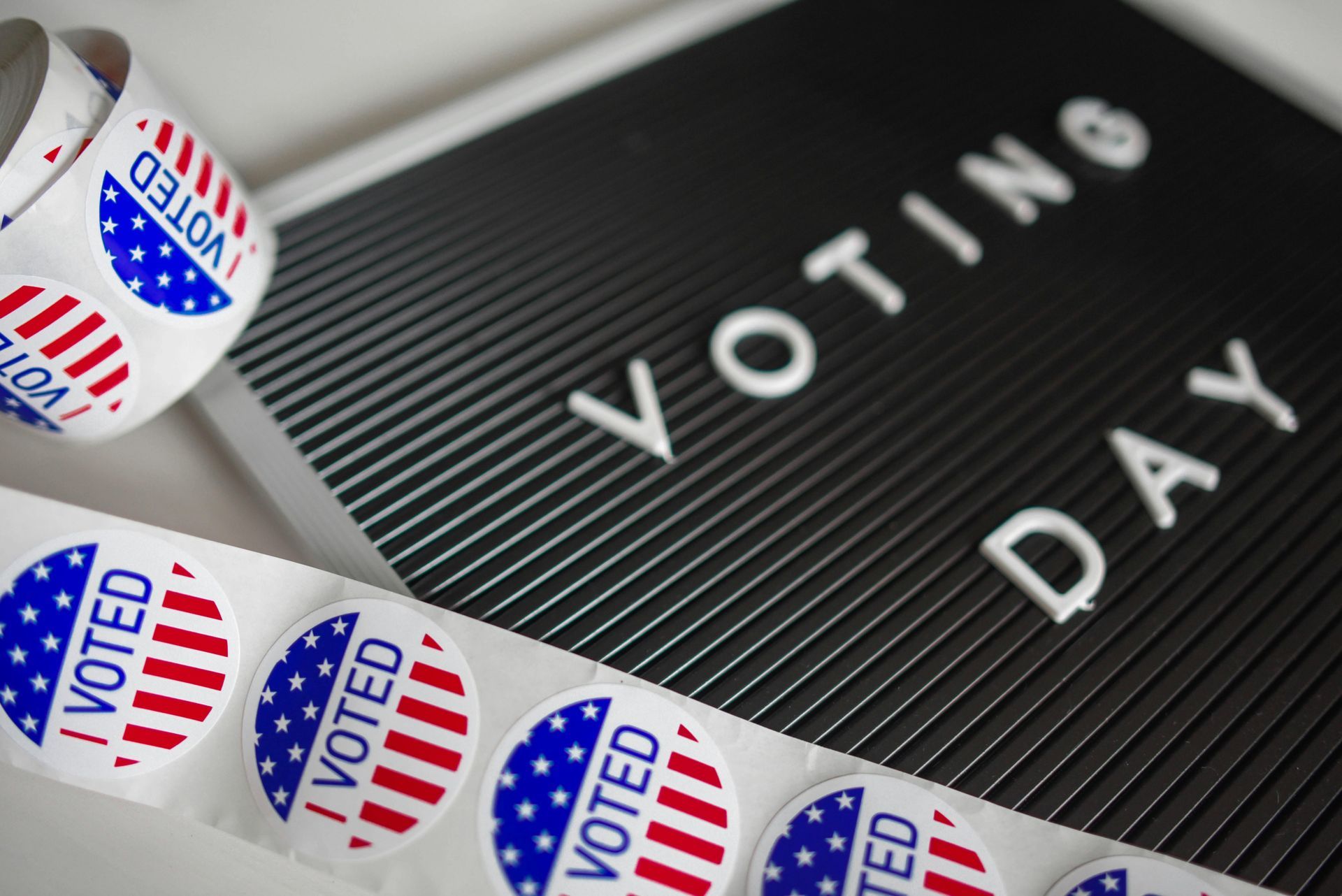How Election Seasons Impact Mental Health: 5 Tips to Manage Anxiety and Stay Informed Without Overwhelm
5 Tips to Manage Election-Related Anxiety

Introduction
Election season: it brings debates, town halls, passionate posts on social media, and constant news updates. But amid this democratic exercise, an underlying issue is often overlooked—the impact of election season on our mental health. For some, the relentless flow of political news, discussions, and divisive opinions can lead to heightened anxiety, stress, and even a sense of dread. This phenomenon, informally known as "election stress disorder," affects people across the political spectrum, leaving many feeling drained and overwhelmed.
In this comprehensive guide, we’ll discuss the real, researched impacts of election seasons on mental health, explain why this phenomenon occurs, and share five expert-backed strategies to protect your mental well-being while staying informed. Whether you're a political enthusiast or just trying to get through the season without feeling mentally exhausted, these insights can help you navigate election season with clarity and peace.
Why Election Seasons Can Harm Mental Health
Elections carry high stakes, with people deeply invested in outcomes that could shape their lives and the lives of others for years to come. This can lead to emotional and cognitive exhaustion, especially when news updates, social media debates, and heated discussions are constant. According to research, the pervasive nature of political information during election cycles triggers stress and anxiety due to factors like fear of the future, uncertainty, and intense societal pressures.
Several psychological mechanisms amplify this stress, such as the phenomenon of negative bias—where our brains focus more on negative information than positive news—and confirmation bias, which fuels the urge to seek news that aligns with one’s pre-existing beliefs. Social media amplifies these tendencies, providing a near-constant stream of content that can amplify fears and anxieties around the election.
The Role of "Election Stress Disorder"
Coined during recent election cycles, "election stress disorder" describes the intense stress, frustration, and anxiety people feel in response to political events and uncertainty. Symptoms can resemble those of generalized anxiety, with people reporting trouble sleeping, difficulty focusing, irritability, and feelings of helplessness. Social factors compound these symptoms, as people often feel isolated in their beliefs or surrounded by conflicting opinions, making it difficult to escape the tension even offline.
5 Essential Tips to Manage Election-Related Stress
To manage election stress without completely disengaging, experts recommend strategies rooted in mental health practices that promote resilience and emotional well-being. Below are five essential tips that can help you navigate this challenging time.
Tip 1: Limit Your Media Consumption to Manage Anxiety
The 24-hour news cycle and social media’s endless updates can create an atmosphere of constant political noise, making it difficult to find mental peace. Consuming news in moderation can help you stay informed without falling into a cycle of anxiety and overwhelm.
Set Specific Times for News Consumption
Consider designating specific times in the day when you check the news or your social media feeds, such as 30 minutes in the morning and 30 minutes in the evening. Research shows that creating a schedule around media consumption can prevent "doomscrolling," where people endlessly scroll through negative news stories.
Use Reliable News Sources
Stick to reliable sources that report news factually and avoid sensationalism. This can minimize exposure to alarmist headlines designed to provoke emotional reactions.
Avoid Checking News Before Bedtime
Studies have found that checking news or social media late at night can elevate stress levels and interfere with sleep. Instead, consider adopting a bedtime routine focused on relaxation.
Stay Off Social Media During High-Volume Periods
Social media can become particularly intense during political events like debates or election night. Taking a break during these times can shield you from unnecessary stress.
Tip 2: Engage in Physical Activity to Relieve Stress
Physical activity has long been recognized as one of the best natural stress relievers. Exercise helps release endorphins, also known as "feel-good" hormones, which can reduce stress and boost mood.
Make Exercise a Regular Part of Your Routine
Aim for 20–30 minutes of exercise daily, whether it’s walking, jogging, yoga, or strength training. Activities that raise your heart rate can counteract the adrenaline spike caused by political stress.
Practice Mindfulness-Based Exercises
Yoga, tai chi, and mindful stretching exercises combine physical movement with deep breathing, helping reduce anxiety. These types of exercises allow you to stay grounded, offering a mental reset.
Take Breaks to Walk Outdoors
Studies show that walking outdoors, especially in nature, can significantly lower levels of the stress hormone cortisol. The fresh air and natural scenery can help clear your mind and give you a break from the tense atmosphere of election season.
Consider Community Sports
Joining a community sports league or fitness group can help you connect with others who share similar interests, providing a sense of belonging without the focus on political news.
Tip 3: Practice Mindfulness and Meditation Techniques
Mindfulness is an effective tool for managing anxiety and staying focused, even during turbulent times. Mindfulness meditation practices can help you find calm by focusing on the present moment and reducing anxiety about future uncertainties.
Start with Simple Breathing Exercises
Focus on your breath for a few minutes daily, paying attention to each inhale and exhale. Breathing exercises are proven to reduce heart rate and induce a relaxation response, which can be incredibly useful when anxiety spikes.
Use Guided Meditation Apps
Apps like Headspace and Calm offer guided meditation sessions specifically aimed at reducing stress and anxiety. These apps have meditations as short as three minutes, which can help if you’re feeling anxious between tasks or before bed.
Practice Gratitude Daily
Focusing on gratitude can shift your perspective away from anxiety and towards positive thoughts. Consider writing down three things you’re grateful for each day, particularly those unrelated to politics.
Mindful Journaling
Journaling is a powerful outlet for processing complex emotions. Reflect on your feelings about the election, what worries you, and how you can address those concerns in constructive ways.
Tip 4: Cultivate Supportive Relationships and Engage in Civil Discussions
Human connection is a significant buffer against stress, and maintaining supportive relationships can help protect mental well-being during election season. However, in a polarized time, handling political conversations with care is essential.
Connect with Supportive Friends and Family
Engage in conversations with people who understand your perspective or who can discuss politics without judgment. A healthy support system provides comfort during times of stress and helps mitigate feelings of isolation.
Set Boundaries Around Political Talk
Let friends and family members know if you prefer to avoid political discussions. Alternatively, set a “time limit” on such topics to prevent intense conversations from becoming draining.
Seek Out Support Groups
Many mental health organizations offer online support groups where people discuss election-related stress in a supportive environment. These groups are usually guided by a mental health professional and are focused on maintaining a safe space for all views.
Engage in Civil Discourse
If you choose to discuss politics, strive for respectful conversation. Research shows that constructive, open-minded conversations can reduce political anxiety, as they reinforce empathy and understanding.
Tip 5: Take Action to Foster a Sense of Control and Purpose
Feelings of helplessness can often drive election-related anxiety, as people worry about outcomes and the future. Taking action, whether through volunteering, advocacy, or personal reflection, can restore a sense of control.
Volunteer for Causes You Believe In
Volunteering for a cause can channel election-related anxieties into positive actions, fostering a sense of empowerment. Working with others towards a shared goal can bring a sense of community and purpose.
Educate Yourself on the Issues
Becoming informed can help counteract feelings of helplessness. Focus on understanding the issues that matter most to you, rather than simply absorbing media coverage. This approach can ground your beliefs in knowledge rather than emotion.
Create a Personal Action Plan
Develop a list of ways you can make a difference outside of election season. This could include ongoing advocacy, volunteering, or education. An action plan helps maintain focus and gives you specific steps to turn stress into positive change.
Find Meaning in Small Acts of Kindness
Even small gestures, like helping a neighbor or donating to a cause, can foster a sense of control and purpose. These acts can serve as reminders of the power of individual action, countering feelings of helplessness.
Turn to Professional Support if Needed
Election seasons can sometimes trigger or worsen anxiety and depression. If you’re struggling, consider reaching out to a mental health professional. Therapy can offer tools to manage stress more effectively and address underlying anxieties.
FAQ Section
FAQ Section
1. Why do elections cause anxiety for so many people?
Elections can feel intense due to the high volume of information and the significant impact political outcomes may have on everyday life. The tension of high-stakes decisions and polarized discussions can lead to a stress response in individuals.
2. What is election stress disorder?
Election stress disorder describes the anxiety and stress some people feel during election seasons. Symptoms include persistent worry about outcomes, difficulty focusing, changes in sleep, and irritability.
3. How can I stay informed without feeling overwhelmed?
Set specific times to check the news, limit exposure to social media, and choose trusted news sources. This approach allows you to stay updated without the stress of constant exposure.
4. Are there mental health resources specifically for election-related stress?
Yes, many mental health professionals offer support for anxiety tied to specific events, including elections. Online therapy, community support groups, and mindfulness apps are available to help manage election-related stress.
5. What are some quick ways to reduce election-related anxiety?
Practicing deep breathing, going for a walk, or talking to a friend can quickly reduce feelings of anxiety. Regular exercise, mindfulness, and setting boundaries around news and social media can also help manage stress over time.
By integrating these strategies, individuals can navigate election seasons with a balanced perspective and a commitment to mental well-being.
Conclusion
Election seasons are inevitably intense, and they can be stressful for people of all political affiliations. However, by taking proactive steps to manage media consumption, prioritize mental and physical health, engage with supportive relationships, and take meaningful actions, you can navigate this season with resilience and clarity. Remember that mental health is a continuous journey, and maintaining balance and perspective during these times can bring long-term benefits.
